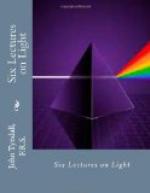This conception of physical theory implies, as you perceive, the exercise of the imagination—a word which seems to render many respectable people, both in the ranks of science and out of them, uncomfortable. That men in the ranks of science should feel thus is, I think, a proof that they have suffered themselves to be misled by the popular definition of a great faculty, instead of observing its operation in their own minds. Without imagination we cannot take a step beyond the bourne of the mere animal world, perhaps not even to the edge of this one. But, in speaking thus of imagination, I do not mean a riotous power which deals capriciously with facts, but a well-ordered and disciplined power, whose sole function is to form such conceptions as the intellect imperatively demands. Imagination, thus exercised, never really severs itself from the world of fact. This is the storehouse from which its materials are derived; and the magic of its art consists, not in creating things anew, but in so changing the magnitude, position, grouping, and other relations of sensible things, as to render them fit for the requirements of the intellect in the subsensible world.[9]
Descartes imagined space to be filled with something that transmitted light instantaneously. Firstly, because, in his experience, no measurable interval was known to exist between the appearance of a flash of light, however distant, and its effect upon consciousness; and secondly, because, as far as his experience went, no physical power is conveyed from place to place without a vehicle. But his imagination helped itself farther by illustrations drawn from the world of fact. ‘When,’ he says,’ one walks in darkness with staff in hand, the moment the distant end of the staff strikes an obstacle the hand feels it. This explains what might otherwise be thought strange, that the light reaches us instantaneously from the sun. I wish thee to believe that light in the bodies that we call luminous is nothing more than a very brisk and violent motion, which, by means of the air and other transparent media, is conveyed to the eye, exactly as the shock through the walking-stick reaches the hand of a blind man. This is instantaneous, and would be so even if the intervening distance were greater than that between earth and heaven. It is therefore no more necessary that anything material should reach the eye from the luminous object, than that something should be sent from the ground to the hand of the blind man when he is conscious of the shock of his staff.’ The celebrated Robert Hooke at first threw doubt upon this notion of Descartes, but he afterwards substantially espoused it. The belief in instantaneous transmission was destroyed by the discovery of Roemer referred to in our last lecture.
Sec. 2. The Emission Theory of Light.




